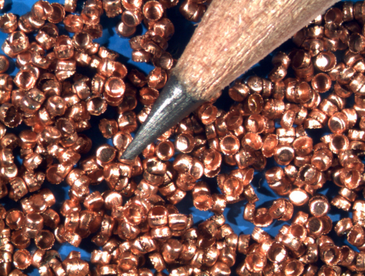An important accolade for the University of Bremen: The German Research Foundation gave the green light for the third – and subsequently last – four-year phase of the Collaborative Research Centre (CRC) 747 “Micro-cold Forming”. This means another 11.2 million euros of funding over the next four years. The 50 engineers and scientists working for the Center are investigating how to optimize the processes used in the manufacture of micro-components and the tools to make them. The research is being done by members of the Faculties of Production Engineering, Physics/Electronic Engineering, and Mathematics/Informatics.
Micro-components can be found in mobile telephones, as well as navigation devices and hearing aids. These micro-components are as small as a rice corn, and if they are to function smoothly must be manufactured with a precision within a thousandth of a millimeter. The CRC is attempting to create the basis to achieve this. “DFGF approval for the third and final phase of funding amounts to an accolade for our University”, says University Rector, Professor Bernd Scholz-Reiter. The prerequisite for prolongation of the CRC was a very thorough evaluation. “The positive result confirms that our researchers have done an exceedingly good job over the past eight years since the CRC was launched”, says Scholz-Reiter. The CRCs lead investigator, Professor Frank Vollertsen, adds: “Prolongation of DFG funding illustrates just how successful interdisciplinary cooperation functions at our University”.
On the way to series production
Working in 18 sub-projects, the researchers will use the third phase of funding to apply their previous findings to the whole production chain in so-called micro-forming engineering in preparation for series production. “That this has worked quite well over the past eight years is illustrated by the fact that funding was acquired for no less than four transfer projects involving cooperation with partners in industry”, says CRC spokesman Professor Vollertsen.
Promoting young researchers and public relations
The third-party funding also benefits young researchers and doctoral candidates: Funding for the “mikromal” project has also been prolonged. The aim of this project is that research assistants disseminate the results of the CRC “Micro-cold Forming” by means of lectures, school projects, competitions and the new media in a way that the layperson can easily understand.
You can receive more information on this topic by contacting:
University of Bremen
CRC 747 “Micro-cold Forming”
Bremer Institut für angewandte Strahltechnik GmbH (BIAS)
Sybille Friedrich (Managing Director)
Phone: +49 421 218-58104
e-mail: friedrichprotect me ?!biasprotect me ?!.de

